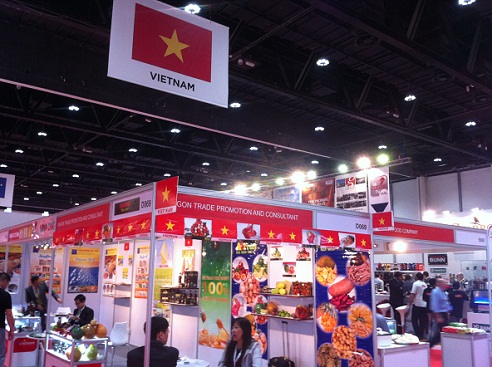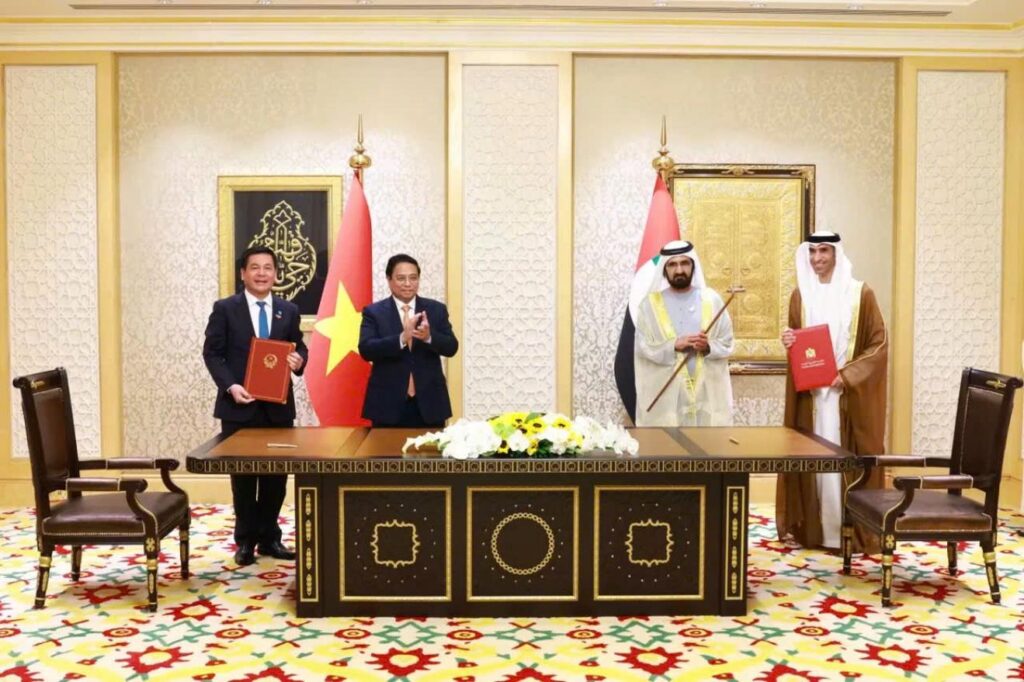Business Opportunities in Qatar: Exploring Outstanding Potential and Effective Approach Strategies
Estimated reading time: 15 minutes
Key Points
- Business opportunities in Qatar are immense with a fast-growing economy and open policies, especially in non-oil sectors.
- Key developing industries in Qatar include oil and gas, construction, information technology, finance, logistics, healthcare, education, tourism, and retail.
- To succeed, businesses need to thoroughly research the market, choose appropriate entry strategies, and build relationships with local partners.
- Many support resources from the Vietnamese and Qatari governments, along with participation in Qatar trade fairs, can help businesses seize opportunities.
- Although there are challenges, thorough preparation and leveraging suitable solutions will help businesses overcome them and achieve sustainable development.
Table of Contents
- Understanding the Qatari Market and Developing Industries in Qatar
- Analysis of Potential and Business Opportunities in Qatar in Developing Industries
- Market Approach Strategy and Business Opportunities in Qatar through Qatar Trade Fairs
- Success Stories Demonstrating Business Opportunities in Qatar
- Challenges and Solutions when Seeking Business Opportunities and Executing Business Expansion Procedures in Qatar
- Available Resources and Support to Seize Business Opportunities in Qatar
- Conclusion: Seizing Business Opportunities in Qatar for Sustainable Development
Business opportunities in Qatar are opening up vast prospects for international businesses and investors, as the country establishes itself as one of the fastest-growing economies in the Middle East. With dynamic development and open policies, Qatar is not only an attractive consumer market but also a strategic hub for trade and investment activities. Exploring opportunities here promises significant benefits, from stable revenue growth to the ability to establish strategic partnerships in diverse fields. The Qatari economy, traditionally driven by abundant energy resources, especially oil and gas, is actively pursuing a policy of economic diversification to reduce dependence on energy, creating conditions for the boom of many developing industries in Qatar. This article will delve into analyzing market potential, key industries, effective market entry strategies, along with valuable support resources for businesses wishing to seize opportunities in this promising Gulf nation.
Understanding the Qatari Market and Developing Industries in Qatar
To successfully tap into the business opportunities in Qatar, the first and most crucial step is to have a deep understanding of this market. Qatar is not only notable for its wealth from natural resources but also for an increasingly improved business environment, aimed at attracting foreign investment into key sectors.
Economic Overview and Business Environment in Qatar
The Qatari economy has traditionally relied heavily on its vast oil and natural gas reserves. However, recognizing the need for sustainable development, the Qatari government has been vigorously implementing the “Qatar National Vision 2030,” a long-term plan to transform the country into an advanced society capable of sustaining development and providing a high standard of living for its people. A crucial part of this vision is to diversify the economy, reduce dependence on the energy sector, and develop other fields.
The Qatari government has implemented many reforms to create a more attractive business environment. These efforts include:
- Simplifying administrative procedures: Reducing bureaucratic hurdles, facilitating the establishment and operation of businesses.
- Developing infrastructure: Investing heavily in modern infrastructure, including seaports, airports, transportation networks, and industrial and logistics zones.
- Encouraging foreign direct investment (FDI): Introducing preferential policies, including allowing 100% foreign ownership in many sectors, and establishing free economic zones with many competitive advantages.
- Enhancing the legal framework: Updating and improving the legal system related to business, investment, and intellectual property to align with international standards.
- Focusing on technological innovation: Encouraging the application of high technology and innovation in all economic sectors.
These efforts have significantly improved Qatar’s position in global rankings for competitiveness and ease of doing business.
Key Economic Sectors and Developing Industries in Qatar
Economic diversification has spurred strong growth in many industries in Qatar. Below are the main sectors contributing to growth and shaping business opportunities:
- Oil & Gas: Despite diversification efforts, oil and gas remain the backbone of Qatar’s economy. The country is one of the world’s leading producers and exporters of liquefied natural gas (LNG). Opportunities in this sector are not limited to extraction but also extend to support services, technology, and maintenance.
- Construction and Real Estate: With the hosting of the FIFA World Cup 2022 and large-scale infrastructure development projects under Vision 2030, the construction and real estate sectors have experienced explosive growth. Demand for housing, offices, shopping centers, hotels, and public works continues to be high.
- Information and Communication Technology (ICT): Qatar aims to become a regional technology hub. The government is investing heavily in digital infrastructure, cloud computing, artificial intelligence (AI), and cybersecurity. This creates opportunities for companies providing software solutions, hardware, telecommunications services, and technology consulting.
- Financial Services: With economic stability and an increasingly complete legal framework, Qatar is developing into an important financial center. Areas such as Islamic banking, asset management, financial technology (Fintech), and insurance have significant potential.
- Transport and Logistics: Its strategic geographical location, along with modern infrastructure like Hamad Port and Hamad International Airport, has turned Qatar into an important logistics and transport hub in the region. Logistics services, warehousing, and supply chain management are areas with many opportunities.
- Healthcare: The Qatari government prioritizes the development of a high-quality healthcare system. The demand for hospitals, specialized clinics, advanced medical equipment, pharmaceuticals, and digital health services is increasing.
- Education: Qatar is investing in building a world-class education system, from preschool to university and vocational training. There are many opportunities for international educational organizations, education technology (EdTech) providers, and specialized training programs.
- Tourism and Hospitality: With unique cultural attractions, modern tourism infrastructure, and international events, Qatar’s tourism industry is on a strong growth trajectory. The demand for hotels, resorts, travel services, and entertainment is immense.
- Retail Trade: High per capita income and a growing population, especially the expatriate community, have fueled the growth of the retail sector. Modern shopping malls, convenience stores, and e-commerce all have development potential.
The synchronized development of these sectors paints a picture of a diverse and dynamic economy, creating an attractive playing field for global investors and businesses.

Analysis of Potential and Business Opportunities in Qatar in Developing Industries
The Qatari market is not only stable but also full of promise with ever-expanding business opportunities in Qatar, especially as the country strives to diversify its economy. Analyses indicate a bright future for forward-thinking investors and businesses.
Detailed Analysis of Business Opportunities in Qatar
Qatar is on an impressive economic growth trajectory. According to experts, the Qatari market is projected to grow at a compound annual growth rate (CAGR) of over 4% during the 2022-2027 period. This growth rate creates a solid foundation for international business expansion and attracting foreign direct investment (FDI). This growth comes not only from the traditional oil and gas sector but also from the strong development of non-oil sectors, reflecting the success of the economic diversification policy.
Key factors driving business potential in Qatar include:
- Political and economic stability: Qatar is known as one of the most stable countries in the region, creating a safe environment for investment.
- Government investment promotion policies: Tax incentives, simplified business registration procedures, and the possibility of 100% foreign ownership in many sectors are major advantages.
- World-class infrastructure: Modern seaport, airport, road, and telecommunications systems facilitate business operations.
- High purchasing power: With one of the highest GDP per capita weltweit, Qataris have significant purchasing power, creating an attractive consumer market for many goods and services.
- Strategic geographical location: Located in the heart of the Gulf, Qatar is a gateway connecting East and West, favorable for trade and logistics activities.
Sectors with High Growth Potential and Developing Industries in Qatar
While the oil and gas sector remains important, Qatar’s economic diversification policy has opened up many attractive opportunities in other developing industries in Qatar. Below are the sectors assessed to have high growth potential:
- Oil and Gas and Ancillary Industries:
- Potential: Though no longer the sole focus, this sector still needs new technologies, maintenance services, and efficiency optimization solutions.
- Data: Qatar is the world’s second-largest LNG producer and plans to significantly expand its production capacity in the coming years.

Qatar is the world’s 2nd largest natural gas producer
- Logistics and Supply Chain:
- Potential: With its strategic location and investment in Hamad Port and Hamad International Airport, Qatar is becoming a regional logistics hub. The demand for smart warehousing, multimodal transport, and integrated supply chain services is increasing.
- Data: The Qatari government aims to increase the role of logistics in GDP. Cooperation programs and logistics business connections between Vietnam and Qatar in 2025 are testament to this potential.
- Construction and Real Estate:
- Potential: Although major projects for the 2022 World Cup have been completed, the demand for urban development, smart housing, green and sustainable real estate projects continues. Infrastructure projects under Vision 2030 are still underway.
- Data: The construction sector is expected to continue to contribute significantly to GDP, with many new infrastructure and tourism projects.
- Information and Communication Technology (ICT):
- Potential: Digital transformation is a top priority for Qatar. There are significant opportunities in areas such as smart cities, artificial intelligence (AI), Internet of Things (IoT), cybersecurity, cloud computing, and software development.
- Data: The Qatari government has committed to investing billions of USD in digital infrastructure and technology initiatives.
- Distribution and Retail Trade:
- Potential: High purchasing power and a growing population, especially skilled expatriate workers, are driving demand for consumer goods, food, fashion, and household items. E-commerce is also growing rapidly.
- Data: Retail sales are projected to continue growing, especially in the luxury goods and convenience services segments.
- Healthcare:
- Potential: Demand for high-quality medical services, private hospitals, specialized clinics, medical tourism, and HealthTech is increasing.
- Data: Per capita health expenditure in Qatar is among the highest in the world, and the government continues to invest heavily in this sector.
- Tourism and Hospitality:
- Potential: After the 2022 World Cup, Qatar aims to attract 6-7 million tourists annually by 2030. This opens opportunities for hotel investors, resorts, travel services, and entertainment attractions.
- Data: The tourism sector is expected to contribute an increasing proportion to Qatar’s GDP.
These sectors, along with others such as education, high-tech agriculture (to ensure food security), and renewable energy, all offer significant opportunities for businesses capable of providing innovative products, services, and solutions aligned with Qatar’s development direction.

Market Approach Strategy and Business Opportunities in Qatar through Qatar Trade Fairs
Entering a new market like Qatar requires a systematic approach and thorough preparation. Adopting the right method will help businesses optimize business opportunities in Qatar and minimize risks. Participating in Qatar trade fairs is also an effective channel to access the market.
Market Entry Strategy for Qatar
- Thorough Market Research:
- In-depth Understanding: Before making any decisions, businesses need to thoroughly research market size, competitors, consumer behavior, industry trends, and legal regulations related to their products/services.
- SWOT Analysis: Evaluate the business’s strengths, weaknesses, opportunities, and threats when entering the Qatari market.
- Choosing a Suitable Entry Mode:
- Direct/Indirect Export: This is the least risky way, suitable for businesses just starting out.
- Finding a Local Distributor or Agent: A local partner who understands the market, culture, and has a good network of contacts will be a great advantage.
- Establishing a Representative Office/Branch: Allows the business to have a direct presence, better control over activities, and brand building.
- Joint Venture: Collaborating with a Qatari company can help share risks, costs, and leverage the partner’s market knowledge.
- Establishing a 100% Foreign-Owned Company: Qatar has allowed this in many sectors, especially in free economic zones like Qatar Financial Centre (QFC) or Qatar Free Zones Authority (QFZA).
- Participating in Delegations, Networking Events, and Investment Seminars:
- Accessing Information: These events are opportunities to get the latest market information, incentive policies, and understand actual needs.
- Finding Partners: These are ideal platforms to meet potential partners, investors, and government representatives directly. Many business matchmaking programs, especially in the logistics sector, are regularly organized, creating a bridge for Vietnamese and Qatari businesses.
- Building Links with Local Businesses:
- Importance of Local Partners: A reputable local partner not only helps with procedures but also assists in reaching customers and understanding the local business culture.
- Networking: Actively build relationships with the local business community and industry associations.
- Leveraging Support Policies and Incentives:
- Tax and Customs Incentives: Research tax exemption/reduction policies, preferential tax rates, and favorable customs procedures that Qatar offers to foreign investors.
- Government Support: Agencies like the Qatari Ministry of Commerce and Industry and the Investment Promotion Agency Qatar (IPA Qatar) often have business support programs.
- Thoroughly Researching Legal Standards and Regulations:
- Legal Compliance: Each business sector in Qatar may have its own regulations and standards. It is mandatory to understand and strictly comply with regulations on labor, environment, product quality, and business registration.
- Legal Consultation: It is advisable to seek advice from law firms experienced in Qatar to ensure all activities are legal.
The Role of Qatar Trade Fairs
Participating in Qatar trade fairs is an important strategy for market access:
- Showcasing Products/Services: Directly introduce products and new technologies to a large number of potential customers and partners.
- Competitor Research: Observe and evaluate the products and strategies of competitors.
- Brand Building: Enhance brand recognition in the Qatari market.
- Gathering Feedback: Receive direct feedback from customers to improve products and services.
- Networking: Meet buyers, distributors, agents, and industry experts.

Sial Middle East Food Fair 2014
Building Effective Networks and Cooperation
Success in Qatar depends not only on good products but also on the ability to build strong relationships.
- Cooperation with Relevant Agencies:
- Vietnam Trade Office in Qatar: This is an important contact point providing market information, business matchmaking support, and advice on procedures.
- Embassies: The Vietnamese Embassy in Qatar and the Qatari Embassy in Vietnam also play important bridging roles.
- Bilateral Business Associations: Joining these associations helps expand networks and update information. Agencies like VCCI (Vietnam Chamber of Commerce and Industry) often coordinate with Qatari partners to organize trade promotion forums and seminars.
- Understanding Business Culture:
- Respect for Local Culture: Qatar is an Islamic country; understanding and respecting cultural and religious values is very important in communication and negotiation.
- Building Trust: Personal relationships and trust are often valued more than purely contractual terms. Patience and building long-term relationships are key.
By combining the above strategies, businesses can gradually penetrate and develop steadily in the Qatari market, making the most of its promising business opportunities.
Success Stories Demonstrating Business Opportunities in Qatar
The Qatari market, with its dynamic development and open policies, has witnessed many success stories of international businesses, including Vietnamese enterprises. These examples are vivid proof of the business opportunities in Qatar and provide valuable lessons.
Successful Models of Vietnamese and International Businesses
- Vietnamese Logistics and Construction Enterprises:
- Market Access: Many Vietnamese businesses in logistics and construction have proactively sought opportunities in Qatar. They often start by participating in market survey missions and trade connection delegations organized by the Ministry of Industry and Trade or industry associations.
- Cooperation Forms: Some companies have succeeded in finding local partners to establish joint ventures or become subcontractors for large infrastructure construction projects, especially during the preparation phase for the FIFA World Cup 2022 and projects under Qatar National Vision 2030. Logistics companies also found opportunities in providing transport and warehousing services for the increasing flow of goods into Qatar.
- Success Factors: Proactiveness, the ability to provide quality services at competitive prices, and building good relationships with Qatari partners are key factors.

Vietnamese Minister of Industry and Trade Nguyen Hong Dien and UAE Minister of State for Foreign Trade Thani bin Ahmed Al Zeyoudi sign the CEPA Agreement – Photo: Duong Giang/VNA
- International Retail Brands:
- Presence: Leading global retail brands in fashion, cosmetics, household goods, and food are present in Qatar’s bustling shopping centers like Mall of Qatar, Doha Festival City, and Villaggio Mall.
- Reasons for Success: They capitalized on the high purchasing power of the local population and the large expatriate community. Providing diverse, high-quality products, excellent customer service, and modern shopping experiences helped them conquer the market. Many brands chose franchising with local partners who understand the market.
- International Educational Organizations:
- Education City: Qatar Foundation established Education City, a unique campus hosting branches of many world-renowned universities such as Georgetown University, Northwestern University, Carnegie Mellon University, and HEC Paris.
- Model: These universities offer international-quality academic programs in Qatar, attracting students from across the region. Strong government investment in education and the demand for high-quality human resources are the main drivers.
- Potential: The demand for international schools from kindergarten to high school, as well as vocational training centers and specialized skills programs, remains very high.
- International Healthcare Service Providers:
- Hospitals and Clinics: Many international private hospitals and clinics have invested in Qatar, bringing specialized medical services and advanced technology.
- Cooperation: Some public healthcare facilities in Qatar also collaborate with reputable international medical organizations to improve service quality and train personnel.
- Attraction: The demand for high-quality healthcare, along with government support, has created favorable conditions for investors in this field.
Lessons Learned from Success Stories
From the success stories above, several important lessons can be drawn for businesses wishing to explore business opportunities in Qatar:
- Thorough Legal Preparation:
- A clear understanding of Qatar’s legal system, especially regulations on investment, business establishment, labor, taxes, and customs, is crucial.
- It is advisable to seek advice from local experienced law firms to ensure compliance and avoid legal risks.
- Enhancing International Negotiation Skills:
- Negotiating with Qatari partners requires patience, cultural respect, and the ability to build personal relationships.
- Thorough preparation of information, negotiation strategies, and readiness for lengthy negotiations are necessary.
- Cultural Adaptability:
- Business culture in Qatar and the Middle East, in general, has its own peculiarities. Understanding customs, traditions, communication norms, and etiquette is very important.
- Respect, politeness, and the ability to build personal trust are often prioritized. For example, learning about Islamic holidays, working hours during Ramadan, or appropriate dress codes will help create a good impression.

The Middle East has a unique business culture
- Finding Reliable Local Partners:
- A local partner who understands the market, has a good network, and is reputable will be an invaluable asset, helping businesses overcome initial hurdles and achieve sustainable growth.
- Product/Service Quality is a Priority:
- The Qatari market, despite its high purchasing power, is also very competitive. Products and services must meet international quality standards and cater to the increasingly high demands of consumers.
- Persistence and Long-term Commitment:
- Success in a new market does not come overnight. Businesses need persistence, a long-term investment commitment, and a willingness to adjust strategies when necessary.
These examples and lessons show that with thorough preparation, appropriate strategies, and a proactive attitude, businesses can absolutely achieve success in the promising Qatari market.
Challenges and Solutions when Seeking Business Opportunities and Executing Business Expansion Procedures in Qatar
Although business opportunities in Qatar are immense, businesses also need to identify and prepare for potential challenges. Simultaneously, understanding the procedures for business expansion in Qatar and finding suitable solutions will help businesses overcome difficulties and achieve sustainable development.
Common Difficulties and Challenges
- Legal Barriers and Administrative Procedures:
- Middle Eastern Market Specifics: Qatar’s legal system, despite many reforms, still has characteristics of the Islamic region and can be complex for foreign businesses new to it.
- Business Registration Procedures: The process of obtaining licenses, business registration, and procedures related to labor and visas can be time-consuming and require extensive paperwork.
- Requirement for Local Partners: In some sectors, there may still be a requirement to have a Qatari partner or sponsor.
- Oil and Gas Price Volatility and Macroeconomic Policy Changes:
- Impact from Energy Prices: Although diversifying, Qatar’s economy is still somewhat affected by fluctuations in global oil and gas prices, which can impact government spending and investment projects.
- Policy Changes: Economic, tax, and investment policies can change, requiring businesses to constantly update to adapt.
- Intense Competition:
- Large International Companies: Qatar is an attractive market, drawing participation from many large corporations worldwide with strong resources and extensive experience.
- Regional Businesses: Companies from neighboring Gulf Cooperation Council (GCC) countries are also formidable competitors.
- Local Businesses: Qatari businesses are growing stronger and have the advantage of market understanding.
- Cultural and Language Differences:
- Language: Arabic is the official language. Although English is widely used in business, basic Arabic knowledge or having Arabic-speaking staff is an advantage.
- Business Culture: Negotiation styles, decision-making processes, and the importance of personal relationships can differ from other Western or Asian markets.
- High Operating Costs:
- Office and Housing Rental Costs: The cost of renting business premises and housing for employees in prime locations in Doha can be quite high.
- Personnel Costs: Salaries for skilled personnel are also relatively competitive.
- “Qatarization” Requirements:
- This policy aims to increase the percentage of Qatari citizens working in various sectors, especially public and semi-public ones. Businesses need to be aware of regulations related to local recruitment and training.
Available Resources and Support to Seize Business Opportunities in Qatar
To support businesses, especially small and medium-sized enterprises, in accessing and exploiting business opportunities in Qatar, there are many valuable resources and support programs from both Vietnam and Qatar. Effectively leveraging these resources will be a crucial catalyst for success.
Resources and Support Programs from Vietnam
- Vietnamese Ministry of Industry and Trade and Trade Promotion Agencies:
- Trade Promotion Delegations: The Ministry of Industry and Trade, the Vietnam Trade Promotion Agency (VIETRADE), and local Departments of Industry and Trade regularly organize business delegations to survey markets, attend fairs, and conduct trade missions in Qatar and other Middle Eastern countries. This is an excellent opportunity for businesses to directly explore the market and meet potential partners.
- Specialized Workshops and Forums: These events provide updated information on the market, policies, potential industries, and experiences in entering the Qatari market. For example, workshops on connecting Vietnamese – UAE – Qatari logistics businesses are typical.
- Market Information Provision: These agencies regularly publish reports and research on the Qatari market, helping businesses gain an overview and strategize.
- Vietnam Trade Office in Qatar (under the Vietnamese Embassy in Qatar):
- Direct Consultation and Support: The Trade Office is an important contact point, ready to advise on the investment and business environment, legal regulations, tariffs, and support connections with Qatari partners.
- Information Bridge: Provides information on trade events, fairs, and exhibitions in Qatar.
- Interest Protection: Assists in resolving trade disputes (if any) for Vietnamese businesses.
- Vietnam Chamber of Commerce and Industry (VCCI):
- Business Connection: VCCI often collaborates with counterpart organizations in Qatar and other Middle Eastern countries to organize business forums and B2B meetings.
- Training and Capacity Building: Offers training courses on international business skills, trade negotiations, and specific market knowledge.
- Issuance of Certificate of Origin (C/O): Supports businesses in export procedures.
- Industry Associations:
- Associations such as the Vietnam Logistics Business Association (VLA), Vietnam Textile and Apparel Association (VITAS), Vietnam Association of Seafood Exporters and Producers (VASEP), etc., often have programs to support members in expanding international markets, including Qatar.
Resources and Support Programs from Qatar
- Investment Promotion Agency Qatar (IPA Qatar):
- One-Stop Shop: IPA Qatar acts as a single point of contact for foreign investors, providing comprehensive information, advice, and support throughout the investment process, from the exploratory phase to project operation.
- Procedural Support: Guides and assists with legal procedures, business registration, and necessary licenses.
- Partner Connection: Helps investors find suitable local partners.
- Qatar Financial Centre (QFC):
- Business Platform: QFC offers a separate legal and business platform, allowing 100% foreign ownership, applying commercial law based on English common law, and having a competitive tax regime (10% corporate profit tax on locally sourced profits).
- Diverse Support: QFC supports companies in various financial and non-financial service sectors.
- Qatar Free Zones Authority (QFZA):
- Free Economic Zones: QFZA manages free economic zones like Ras Bufontas and Umm Alhoul, offering attractive incentives such as a 20-year corporate tax exemption, 100% foreign ownership, and simplified customs procedures.
- Focus on Strategic Industries: These free zones focus on attracting investment in new technology, logistics, chemicals, and light industry.
- Qatari Ministry of Commerce and Industry (MOCI):
- Information and Regulations: MOCI is responsible for Qatar’s trade, industry, and investment policies. MOCI’s website provides useful information on laws and regulations.
- Business Registration: MOCI manages the registration and licensing process for most types of businesses.
- Logistics Development and Regional Trade Integration Program:
- Qatar is investing heavily to become a leading logistics and trade hub. Initiatives and programs for developing logistics infrastructure, seaports, and airports create favorable conditions for businesses in this field.
- Policies aimed at enhancing trade integration with countries in the region and the world also open opportunities for import-export businesses.
By proactively researching and utilizing these support resources, businesses can reduce initial difficulties, save time and costs, and enhance their chances of success when deciding to seize business opportunities in Qatar.
Conclusion: Seizing Business Opportunities in Qatar for Sustainable Development
In summary, business opportunities in Qatar are incredibly significant and diverse, extending far beyond the traditional image of a nation solely reliant on oil and gas. Thanks to a strongly growing economy, increasingly open policies, and relentless efforts to diversify industries, Qatar has been and continues to assert its position as an attractive destination for global investors and businesses. From high-tech sectors, financial services, construction, real estate, tourism, and hospitality, to logistics and retail trade, each industry holds distinct potential, waiting to be explored.
The success of many international and Vietnamese businesses in this market is clear evidence that, with thorough preparation, smart approach strategies, and flexible adaptability, conquering the Qatari market is entirely feasible. However, businesses also need to be clearly aware of potential challenges such as cultural differences, specific legal systems, and a highly competitive environment.
We encourage businesses and investors to proactively delve deeper into the Qatari market. Careful market research, building reliable partnership networks, and especially making the most of support resources from both the Vietnamese and Qatari governments will be key factors leading to success. Do not hesitate to participate in trade promotion delegations, specialized workshops, and seek advice from experts.
The journey to explore and seize business opportunities in Qatar can be challenging, but the rewards for those who are persistent and well-prepared will be immense. Start today: research, connect, and act to turn potential into reality, contributing to the sustainable development of your business in one of the most dynamic markets in the Middle East. Qatar is extending its arms to welcome innovative business ideas and long-term strategic partners.

